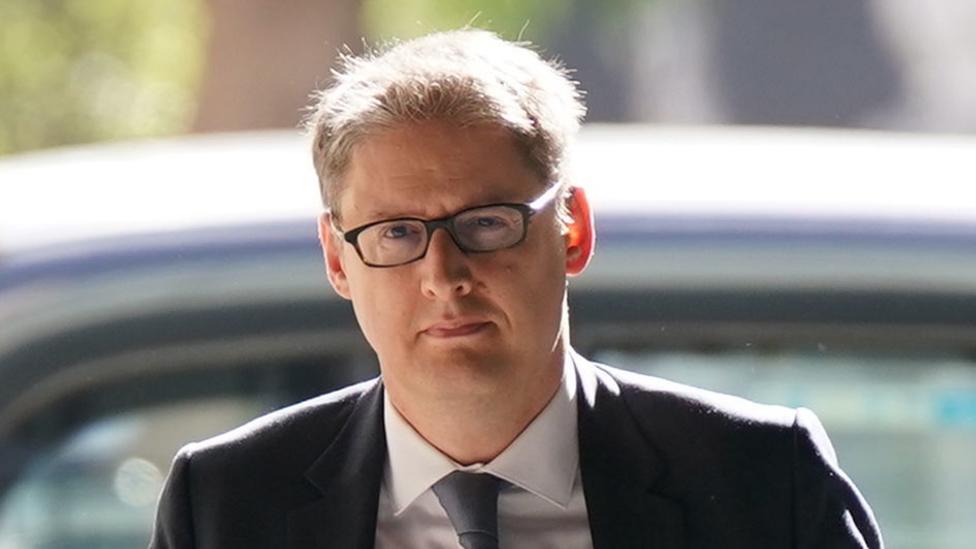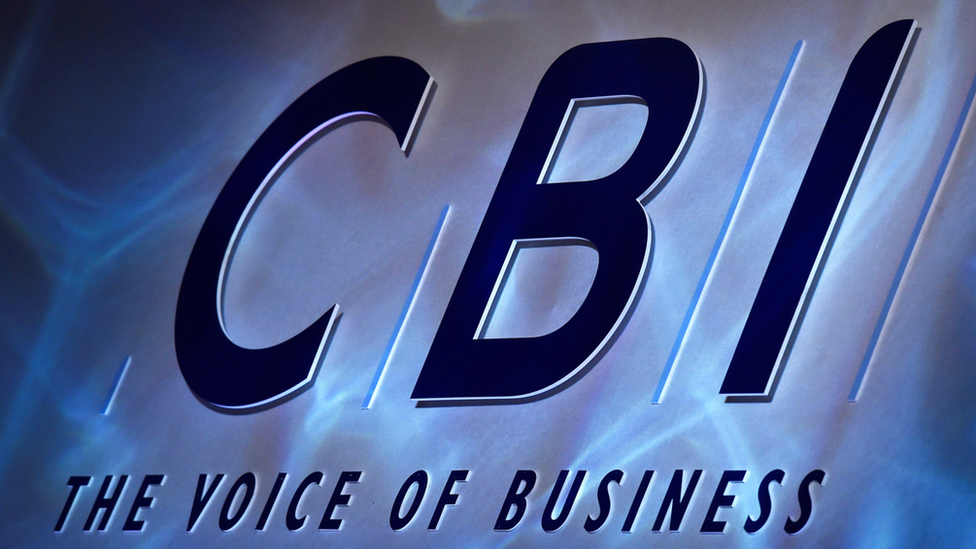Sacked CBI boss Tony Danker says reputation 'totally destroyed'
- Published
Watch: Ex-CBI boss Tony Danker apologises but says he was made "the fall guy"
The former boss of business group giant the CBI says his "reputation has been totally destroyed" after being fired over complaints about his behaviour.
Tony Danker acknowledged he had made some staff feel "very uncomfortable", adding: "I apologise for that."
But he said his name had been wrongly associated with separate claims, including rape, that allegedly occurred at the CBI before he joined.
The CBI's president said Mr Danker was dismissed on strong legal grounds.
Brian McBride told the BBC's Today programme that Mr Danker's description of events was "selective" and he was free to seek "redress" if he felt unfairly treated.
Mr Danker said he was considering legal action but does not want to sue.
Mr Danker refused to show the BBC a copy of his dismissal letter, but in his first interview since being fired on 11 April, he said it had cited four reasons for firing him:
Organising a secret and private karaoke party for 15 people after a Christmas work event
Viewing the Instagram accounts of CBI staff
Sending non-work related messages to staff on work messaging platforms
Inviting junior staff to breakfasts, lunches or one-on-one meetings
Mr Danker accepted that some staff may have found his approach at work uncomfortable and apologised for that - but he did not believe his immediate sacking was warranted.
Instead, he claimed he had been made "the fall guy" for a wider crisis engulfing the CBI.
Mr Danker was asked to comment on the allegations made against him, including that he made unwanted verbal remarks and sent a barrage of unwanted messages featuring sexually suggestive language over more than a year.
"I have never used sexually suggestive language with people at the CBI. You know, there was an incident somebody raised a complaint about unwanted contact, which was verbal contact.
"There was never any physical contact. I've never had any physical contact. I've never used any sexual language. I've never propositioned anybody," Mr Danker said.
Sexual harassment is unwanted behaviour of a sexual nature, says Alison Loveday, an employment lawyer at Lockett Loveday McMahon Solicitors.
"It must have either violated someone's dignity, whether it was intended or not, or created an intimidating, hostile, degrading, humiliating or offensive environment for them, whether it was intended or not."
A former CBI staff member, who has been in touch with existing workers at the organisation, said they were "furious" and "upset" by Mr Danker's interview.
"It's important that we remember who the victims of this situation are: the women who've had negative experiences with men at the CBI," she said.
"They have described to me feeling furious, grossed out and upset by Danker's attempts to downplay his role in this situation. As director general, Danker bore responsibility not only for his own actions but for the culture of the organisation under which numerous men acted inappropriately.
"He shouldn't be permitted to sweep that under the carpet."
Brian McBride, president of the CBI, said sacked director-general Tony Danker was "selective" in his description of allegations.
The CBI is facing a number of claims from 2019 including drug use as well as serious sexual assault which is being investigated by City of London police.
Mr Danker said his reputation has been "totally trashed" because these claims emerged a matter of weeks after the business lobby group disclosed that it was looking into separate allegations of misconduct against him.
The CBI has said Mr Danker's dismissal followed an independent investigation into specific complaints of workplace misconduct against him.
Mr Danker admits that he did look at the Instagram profiles and stories of "a very small number of CBI staff, men and women".
"The CBI already knew that some people thought that that was intrusive, and I get that," he said.
"I get that people felt that it was wrong, that I was looking at their admittedly completely public Instagram stories", he added.
Mr Danker, who joined the CBI in November 2020, also acknowledged he had messaged around 200 individual staff members, but said it was part of building "rapport" during lockdown as well as with colleagues who continue to work from home.
He said these messages said things such as: ''Hi, how are you? How was your weekend? Show me pictures of your dogs or your babies".
But he believed some people had thought the messages inappropriate, and they had not realised Mr Danker had "been doing this to everyone to try and build rapport."
Finally, he said that the invitations to junior staff for lunches and breakfasts were part of a CBI mentoring scheme called the Shadowing Programme. Mr Danker said both male and female employees were invited by Mr Danker to discuss their careers.
In Mr Danker's recollection, the "private" karaoke party came after people suggested it after a CBI Christmas party in 2021.
Mr Danker said he booked a room for 15 people which was "the largest I could get".
"I emailed everybody saying 'here's the address', no cameras allowed', because everybody said to me 'I don't want to be filmed singing karaoke'," he said.
Asked why he has chosen to speak publicly, Mr Danker said he'd rather not talk to the media.
But he said: "It is just not OK to throw somebody under the bus and ask them to be the fall guy when their entire reputation is destroyed."
But Mr McBride said Mr Danker had been sent a legal letter setting out the grounds for his dismissal "in detail", but had not been shown the report of the independent investigation by law firm Fox Williams to keep the complainants anonymous.
"The board lost its trust and confidence in his ability to lead the organisation and represent the CBI in public," Mr McBride said.
Mr McBride said the CBI also wished to make clear that Mr Danker "is not the subject of any of the more recent allegations", including rape.
The CBI - the Confederation of British Industry - is one of the UK's leading business lobby groups, claiming to speak for 190,000 companies.
Since the scandals emerged, major companies that are members have paused engagement with the group or expressed their concerns. The government has also stopped working with the CBI while investigations continue.
However, Mr McBride said: "I don't believe that government should wait for 18 months for the result of a potential rape case" to talk to the CBI, adding that the organisation expected to get back to lobbying "quite quickly".
If you have been affected by any issues raised in this article, help and support can be found at BBC Action Line.

Have you been affected by the issues discussed in this story? Please share your experiences by emailing haveyoursay@bbc.co.uk, external.
Please include a contact number if you are willing to speak to a BBC journalist. You can also get in touch in the following ways:
WhatsApp: +44 7756 165803
Tweet: @BBC_HaveYourSay, external
Please read our terms & conditions and privacy policy
If you are reading this page and can't see the form you will need to visit the mobile version of the BBC website to submit your question or comment or you can email us at HaveYourSay@bbc.co.uk, external. Please include your name, age and location with any submission.
Related topics
- Published11 April 2023

- Published3 April 2023
